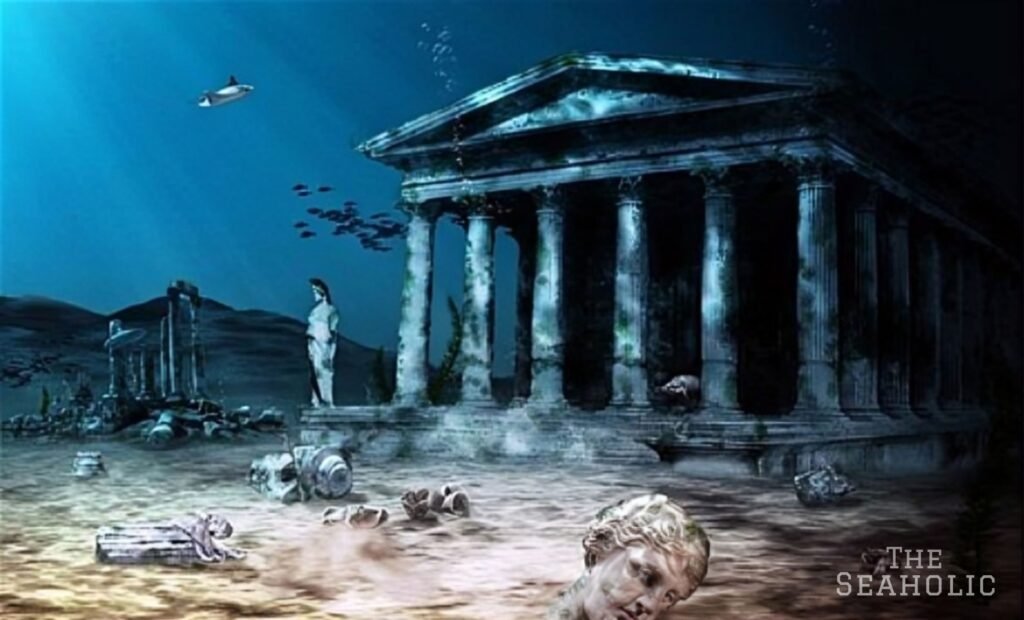The world is full of unsolved mysteries. Despite the great achievements in the field of science, we, human beings remain clueless about many things around us.
Rather than the land we live in, what seems stranger to us is the ocean, which is home to many myths, legends and mysteries. While scientists have succeeded in explaining many of these mysteries, there are quite a few still remaining as unexplained.
Lost cities, hidden treasures, mystic ships are all part of the alluring marine world. Of all these, the lost city of Atlantis tops the list.
The Lost City of Atlantis, first mentioned by the ancient Greek philosopher Plato more than 2,300 years ago, is known as one of the oldest and greatest mysteries of the world.
According to Plato, the utopian island kingdom existed some 9,000 years before his time and mysteriously disappeared one day. Famed for having been the exhibit of all worldly pleasures in the world, this city is as enigmatic as it is inviting.
Even after years of research, the exact truth about this city has not been found and that adds even more to all the folklores attached with it. Read on to find what’s so fascinating about this city?
1. Where is Atlantis – The Mysterious Location

The biggest question that boggles the minds of all the scientists is that where is Atlantis. The narrations suggested that the city is believed to have sunk into the sea after an earthquake or tsunami. According to him, the so-called Atlantis was a large island located near the Rock of Gibraltar and consisted of a Poseidon temple and concentric walls and canals.
Plato added that the city under the sea should have been somewhere in the Atlantic Ocean. However, no technology so far has revealed any such city on the ocean bed.
While some theories suggested that the Atlantis is located in the Mediterranean, off the coast of Spain, few also argued that it could be even under Antarctica.
For a long time, Azores was believed to be the site of the city of Atlantis. However, the new researches have revealed a new site and the scientists are sure that Atlantis can be found in Cadiz, somewhere between the Spain and Morocco waters.
The extent of truth in this story is really a mystery in itself. Questions like where are Atlantis or do it even exist for real are still unanswered. But until the truth beneath it can be completely unravelled, the world will continue speculating about the existence of the greatest city of all times.
Also Read, How Atlantic Ocean got its name
2. The unknown size of ‘the giant city’
Plato, talking about the mysterious underwater kingdom, wrote: “For the ocean, there was at that time navigable; for in front of the mouth which you Greeks call, as you say, ‘the pillars of Heracles,’ there lay an island which was larger than Libya and Asia together; and it was possible for the travellers of that time to cross from it to the other islands, and from the islands to the whole of the continent over against them which encompasses that veritable ocean.”
Agreeing with Plato over the size of the island, Tertullian, an early Christian author who believed that Atlantis really once existed in the Atlantic Ocean, said it would be bigger than today’s Libya and Asia combined.
Since many others proposed the location of the city of Atlantis in the Mediterranean Sea, narrations have come out scaling the size of the city to Crete, Greece’s largest island.
However, in many stories after Plato’s era, the Atlantis was described as a giant city, missing anything specific about the size of the city. Edgar Cayce, an American Christian mystic, suggested that the Atlantis and Eurasia were equal in size.

3. Tale of God’s love
Legend says that the Atlantis city was built by Poseidon- the God of Sea, of storms and earthquakes- when he fell in love with a mortal woman Cleito. He made this city on top of a hill, on an isolated island in the sea, to protect her and named it Atlantis.
According to the story, Poseidon walked through the world in an effort to find the biggest island until he reached the biggest of them all Atlantis and found it to be inhabited by people who were more beautiful and intelligent than the rest of the world.
It was then he fell in love with Cleito when he finds her on the island.
4. The ‘Captivation’ Palace
The new home built by Poseidon for his love in the City of Atlantis was surrounded by rings of water and land. The five rings of water were connected to the land with the help of five tunnels, where a huge canal connected the outer rings of water to the ocean.
The tunnels were able to accommodate ships and every route to the city was guarded by gates and towers. Moreover, the wall that surrounded the rings was built using red, white and black rock and was decorated with precious metals.
Meanwhile, there was another hill called the ‘Hill of Cleito’ where, it is believed, Poseidon captivated his wife because he was distrustful of her loyalty. This hill was surrounded by huge moats and pillars.
5. The Golden Statue of Poseidon
The fable tells that Cleito had five pairs of twin sons with Poseidon, the eldest of which was named Atlas. The ten sons inherited the great city and the first child, Atlas, became the first ruler of Atlantis.
However, it is believed they also built a huge temple for their father with a giant statue of Poseidon riding a chariot carried by winged horses.
The statue was completely built-in gold and placed in a temple with its spiral roof so high up that the clouds drifted through the spirals of the temple.
Also Read, Famous story behind The Golden Statue of Poseidon & Myths
6. The self-sufficient and rich city
The fertile and beautiful city of Atlantis, where half-god and half-human beings lived, is believed to have been a self-sufficient region where people grew their own food and reared animals.
Farmers in the city used to grow the crops in the fertile plains on the outskirts with the help of a well-maintained irrigation system.
They also built beautiful buildings and other architectures from materials like black and red stone. They also had access to rare metals and even alloys like brass made and used crystals extensively for leisure and experimental purposes and had a lot of free time to even play with volcanoes.
7. Rising of Atlantis
Other than the legend of the lost city of Atlantis and other fables, the fact about the city still remains unknown. Among historians and other researchers, the findings of Edgar Caycehad something different to tell.
Edgar Cayce believed in the rising of the lost city once again like ‘the sun rises from the sea’. He predicted a new land would appear off the east coast of North America.
He also suggested that the souls of a number of people lived in Atlantis had been incarnating to America in order to usher in a new era of enlightened human consciousness.
8. Atlantis’ extra-terrestrial connection
Stories also claim that the original inhabitants of the lost city of Atlantis are believed to be of extra-terrestrial origin who reached there about 50,000 years ago from the Lyrian star system.
Despite being much taller and fairer than today’s average human being, the average life span of these people is believed to have been 800 years, making them really robust and strong prototype of the existent human race then.
9. Exceptional powers of Atlanteans
As some claim that the Lost City of Atlantis was on Mars, or was just a colony of an alien civilization, the inhabitants of the Atlantis city are believed to have the possessors of exceptional powers such as the ability to control the weather, modify volcanic eruptions.
Some accounts also mention their possession of some sort of device that allowed them to channel energy from time and space.
Even though the myth says that the inhabitants of Atlantis City were superior beings, there are some of the opinions that it is just a mythical representation of a barbaric fashion of life.
10. A fable based on real events?
While many still consider the Lost City of Atlantis is just a legend, there are many conspiracy theories doing the rounds suggesting that the fable is actually based on real events.
Ocean explorer Robert Ballard finds logic in the story as it has similarities with a massive volcanic eruption in the island of Santorini in the Aegean Sea near Greece.
Ballard says a highly advanced society that lived there disappeared suddenly as happened with the Atlantis. Similarly, Ignatius Donnelly also confirms the existence and disappearance of a mid-Atlantic continent that was in the exact location that Plato mentioned.
As the debate goes on, few researchers claimed that this utopian kingdom was a real continent located off the Bahamas and it was swallowed up by the Bermuda Triangle later, while another group suggested current Antarctica is the newer version of Atlantis.
Meanwhile, James Romm, a professor at Bard College in Annandale in New York, says Plato himself created the story in order to convey some of his philosophical theories, mostly about his vision of an ideal civilization.
10 Quick Facts About the Lost City of Atlantis
The lost city of Atlantis, a subject of fascination and debate for centuries, is a mythical civilization described in the works of ancient Greek philosopher Plato. Here are 10 facts about Atlantis:
- Origins: Atlantis was first mentioned in Plato’s dialogues “Timaeus” and “Critias” around 360 B.C. Plato claimed that the story was passed down by poets, priests, and others, and that Atlantis existed about 9,000 years before his own time.
- Location: Plato provided only one clue to Atlantis’ location, stating it was “in front of the Pillars of Hercules,” which places it near the Strait of Gibraltar at the western edge of the Mediterranean Sea.
- Description: Atlantis was a utopian civilization made of concentric islands separated by wide moats and connected by canals, rich in metals and minerals like gold and silver, and supported exotic wildlife.
- King of Atlantis: Cleito had five pairs of twin sons with Poseidon, and the eldest, Atlas, became the great king of Atlantis.
- Fall of Atlantis: The city was said to have fallen due to the people’s greed and immorality, which angered the gods, who sent a night of fire and earthquakes that led to the city being drowned.
- Research: Various researchers have proposed locations for Atlantis, including the Mediterranean, off the coast of Spain, and even under Antarctica4.
- Recent Research: In 2011, Professor Richard Freund identified a possible location near the marshlands of the Doñana National Park in Spain, claiming that Atlantis could have been wiped out by a tsunami.
- Similarities: Ocean explorer Robert Ballard finds logic in the story, as it has similarities with a massive volcanic eruption on the island of Santorini, which led to the disappearance of the Minoan civilization.
- Philosophical Theories: James Romm, a professor at Bard College, believes that Plato created the story of Atlantis to convey some of his philosophical theories, mostly about his vision of an ideal civilization.
- Mystery: Despite centuries of research, the exact location and existence of Atlantis remain unknown, adding to the allure of the mythical city.
Also Read, Amazing Facts about Mighty Poseidon – God of the sea

